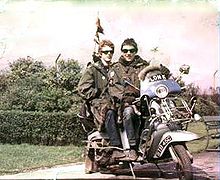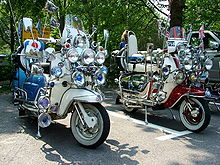- Mod revival
-
Mod revival Stylistic origins Mod, rhythm and blues, jazz, reggae, ska, soul, beat, power pop, pub rock, punk rock, new wave[1][2] Cultural origins late 1970s, England (mostly London)
early 1980s, United StatesTypical instruments Guitar – bass – drums – brass – keyboards Mainstream popularity Mainly late 1970s & early 1980s, with some continuing interest Derivative forms Britpop, Indie rock Regional scenes United Kingdom, then other countries Other topics Timeline of punk rock, Quadrophenia (film) The mod revival was a music genre and subculture that started in England in 1978 and later spread to other countries (to a lesser degree).[3][4][5] The mod revival's mainstream popularity was relatively short, although its influence has lasted for decades. The mod revival post-dated a Teddy Boy revival, and mod revivalists sometimes clashed with Teddy Boy revivalists, skinhead revivalists, casuals, punks and rival gang members.[6]
Contents
1970s
The late 1970s mod revival combined musical and cultural elements of the 1970s pub rock, punk rock and New Wave music genres with influences from 1960s mod and beat music bands such as The Who, Small Faces and The Kinks. The revival was largely spurred on by the band The Jam, who had adopted a stark mod look and mixed the energy of punk with the sound of 1960s mod bands. The Great British Music Festival, with the Jam, at Wembley in 1978 may have helped to kickstart the mod revival.[7] The revival was also spurred on by small concerts at venues such as the Cambridge and Hop Poles Hotels, and Howard Hall Enfield, the Wellington, Waterloo Road, London, and the Bridge House in Canning Town. In 1979, the film Quadrophenia, which romanticised the original 1960s mod subculture, widened the impact and popularity of the mod revival across the UK. The original mod revival fanzine, Maximum Speed started in 1979 and spawned other home-produced fanzines from then until the mid- to late 1980s.
Whereas the original mods looked forward (although maintaining nostalgia for British cultural icons), the mod revival was a conscious effort to harken back to an earlier generation in terms of style. Like their 1960s mod predecessors, revival bands were often self-consciously British (i.e. displaying Union Jack flags and the Royal Air Force roundel). Mod revivalists were usually from working class backgrounds, or aimed to appear so. The mod revival contained a wide range of individuals; from those who were peacockish, colourful, and dandified – wearing suits and styles of the 1960s – to others who took a more minimalist approach; wearing basic casual items such as fitted jeans, Fred Perry tennis shirts and fishtail parkas.
Some mod revivalists were mostly interested in live performances by contemporary bands, and others focused on DJ events featuring recordings of 1960s music. During this period, the interest in R&B and soul music increased, with a small number of clubs and bars holding events; such as Henri's at the Bedford Head in London's Covent Garden, 6T's (later to move to the Starlight club in West Hampstead, which in turn moved to 100 Club), the Top Alex in Southend, the Hercules in Lambeth North, The Castle in Tooting, Cheeky Pete's in Richmond, the Mildmay Tavern in Dalston, and the Crystal Palace Hotel. In addition to The Jam, notable mod revival bands include: The Chords, Purple Hearts, The Merton Parkas, Secret Affair, The Lambrettas, The Jolt, and The Fixations.
Another British tradition that returned at the same time was the penchant for members of youth subcultures to go to seaside resorts on bank holidays and fight members of other subcultures. This originated in the early 1960s with the mods and rockers fighting each other at places such as Brighton. The phenomenon returned in 1969 through to 1970 with skinheads fighting Teddy boys and bikers. In 1977 it returned yet again, with punks fighting Teddy Boys at Margate, and revival skinheads fighting Teddy boys, bikers and rockers at Southend and Margate. This carried on until 1978. In 1979 and 1980, the resorts became major battlegrounds on bank holidays for young skinheads and mods together against Teddy boys and rockers. By 1981, the unity between skinheads and mods had mainly disappeared, and by the mid-1980s, casuals (well-dressed football hooligans) had joined in the disturbances. Some of the main resorts involved were Margate, Brighton, Southend, Clacton, Hastings and Scarborough.[8]
1980s
In the early 1980s in the UK, a mod revival scene influenced by the original 1960s mod subculture developed at the Shepherds Bush nightclub Sneakers, which was run by Paul Hallam and Richard "Shirley" Early. The club featured rare R&B and soul music, and attendees wore sharp tailor-made clothing. Also in Shepherds Bush through the early to late 1980s was Club MOD, at The Bush Hotel, where Tony Class DJed soul music and songs by mod revival bands. The mod revival also had some crossover with the 2 Tone ska revival of the late 1970s and early 1980s; associated with bands such The Specials, The Beat, The Selecter, and Madness. Often these bands wore mod-like clothes, and their roots in black music paralleled that of the original mods.
In the mid 1980s, there was a brief mod revival centred around bands such as The Moment and The Prisoners. Fanzines following on from Maximum Speed – such as Mission Impossible, Patriotic, Roadrunner, Extraordinary Sensations and Chris Hunt's Shadows & Reflections – helped generate further interest in this stage of the mod revival.[9] In 1983, Paul Weller of the band The Jam formed The Style Council, a soul-influenced New Wave band. Also in the mid-1980s, the northern soul scene underwent a change of pace, with slower R&B-style records becoming popular at all-nighters at clubs such as Top Of The World in Stafford and 100 Club in London. Around this time, some mod revivalists became interested in psychedelic rock, freakbeat and rare British and American garage rock. This interest was partly sparked by companies re-issuing recordings by bands such as The Action and The Creation.
Many revival mods in the UK joined the scooterist and scooter rally scene, which led to the development of the scooterboy subculture of the 1980s. Several mods enjoyed a mixture of the two styles, although some scooterboys renounced any previous involvement with the mod subculture.
The UK mod revival was followed by a mod revival in North America in the early 1980s, particularly in Southern California, led by bands such as The Untouchables.[6][10][11] The mod scene in Los Angeles and Orange County was partly influenced by the 2 Tone movement, and was unique in its racial diversity.
In the 1990s, Britpop bands such as Oasis, Blur and Ocean Colour Scene were influenced by the mod revival; both in music and fashion. In the 2000s, some indie rock acts, such as The Ordinary Boys, Kaiser Chiefs, The Last Shadow Puppets, Twisted Wheel and Rinaldi Sings, were influenced by the mod revival.
Another main player in the mod revival was Eddie Piller, who went on to develop the acid jazz movement of the late 1980s.[12]
Footnotes
- ^ "Chris Hunt , Mod Revival". Chrishunt.biz. 14 April 1979. http://www.chrishunt.biz/features08.html. Retrieved 15 May 2011.
- ^ www.garry-bushell.co.uk – Mod Squad[dead link]
- ^ "The Modpoppunk Archives". Punkmodpop.free.fr. http://punkmodpop.free.fr. Retrieved 15 May 2011.
- ^ Punks in Parkas
- ^ http://www.cavern-liverpool.co.uk/cavernclub/profiles/jackie_profile.htm
- ^ a b Mysterymod (23 April 1985). "Modstories". Modrevival.net. http://www.modrevival.net/Modstories.html. Retrieved 15 May 2011.
- ^ "Runboard.com – free message boards, free forums". Com2.runboard.com. http://com2.runboard.com/bmodrevivalforums.f1.t8832. Retrieved 15 May 2011.
- ^ "Best Bank Holiday weekend ~ at Runboard.com". Com2.runboard.com. http://com2.runboard.com/bmodrevivalforums.f1.t8718. Retrieved 15 May 2011.
- ^ Fanzine Extraordinary Sensations Eddie Piller http://www.sohostrut.co.uk/eddie.html
- ^ "California Mod Scene". California Mod Scene. http://california-mod-scene.com/. Retrieved 15 May 2011.
- ^ "I was a South Bay Mod!". Southbayscooterclub.com. 13 November 1987. http://www.southbayscooterclub.com/sbsc/sbmod/sbmod.html. Retrieved 15 May 2011.
- ^ Eddie Piller Acid Jazz http://www.sohostrut.co.uk/eddie.html
External links
- The Mod Revival Article by Chris Hunt, published in the New Musical Express, April 2005
- The ModPopPunk Archives Information about mod revival bands
- Mod-ernworld Information and photos
- 1980s Mod Revival Photos from the 1980s Mod scenes from around the world
New Wave music Regional scenes Other topics Mods General 1960s - Blowup - Casuals - United Kingdom - Lambretta - Pete Meaden - Mods & Rockers - Pop art - Quadrophenia (film) - Roundel - Scooter - Scooterboy - Sharpies - Skinhead - Soulboy - Suedehead - Swinging London - Speed (drug) - Twisted Wheel - Union Jack - Youth subculture - VespaMusic 2 Tone - Acid Jazz - Beat music - Blue-eyed soul - Blue Beat - British Invasion - British rhythm and blues - Britpop - Freakbeat - Garage rock - Jazz - Mod revival - Modern soul - Motown - Northern Soul - Post-punk revival - Power Pop - Psychedelic rock - Reggae - R&B - Rocksteady - Soul - Ska - Stax Records - Trojan RecordsClothing Ben Sherman - Bespoke tailoring - Brogues - Carnaby Street - Chelsea boot - Fishtail parka - Fred Perry - Harrington - Levi's - Loafers - Parka - Sta-Prest - SuitPunk rock 2 Tone - Anarcho-punk - Art punk - Celtic punk - Christian punk - Cowpunk - Crust punk - Dance-punk - Deathrock - Digital hardcore - Folk punk - Garage punk - Glam punk - Gothic rock - Gypsy punk - Hardcore punk - Horror punk - Nazi punk - New Wave - No Wave - Noise rock - Oi! - Pop punk - Post-hardcore - Post-punk - Psychobilly - Punk blues - Punk jazz - Punk Pathetique - Queercore - Rapcore - Crunkcore - Riot grrrl - Scottish Gaelic punk - Ska punk - Skate punk - Street punk - Synthpunk - Taqwacore - TrallpunkOther topics Afro-punk - Protopunk - DIY ethic - First wave punk musicians - Second wave punk musicians - List of punk bands: #–K, L–Z - Punk subculture - Punk fashion - Punk ideologies - Punk visual art - Moshing - Punk literature - Punk zine - Straight edge - Punk films (list) - Punk filmmakers - Timeline of punk rockSee also: The punk music portal Categories:- Mod revival
- Youth culture in the United Kingdom
- Punk genres
Wikimedia Foundation. 2010.


